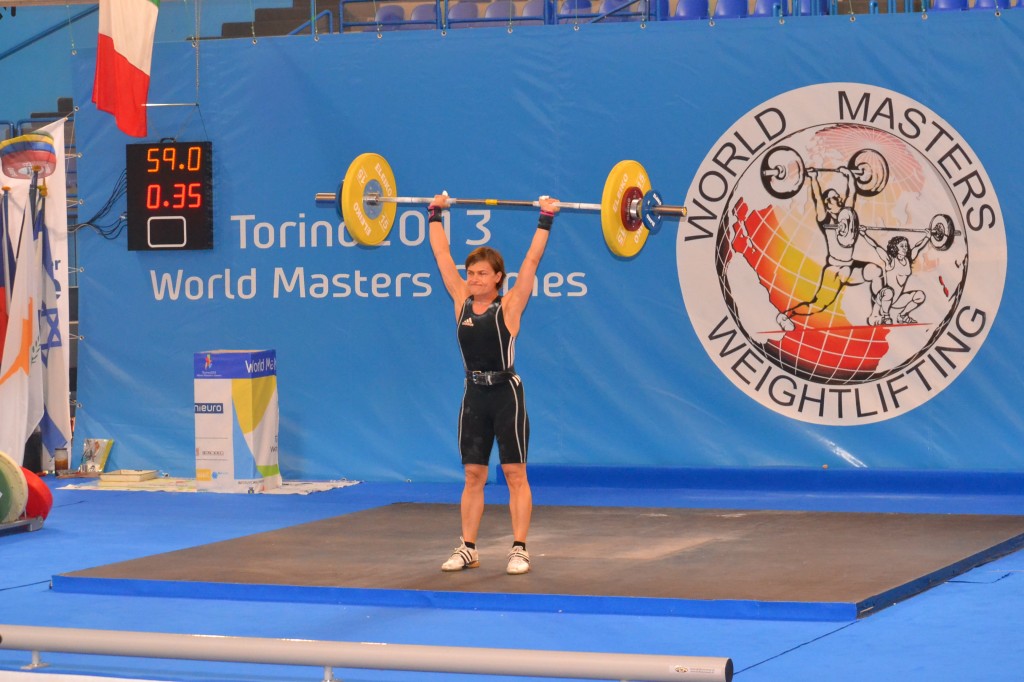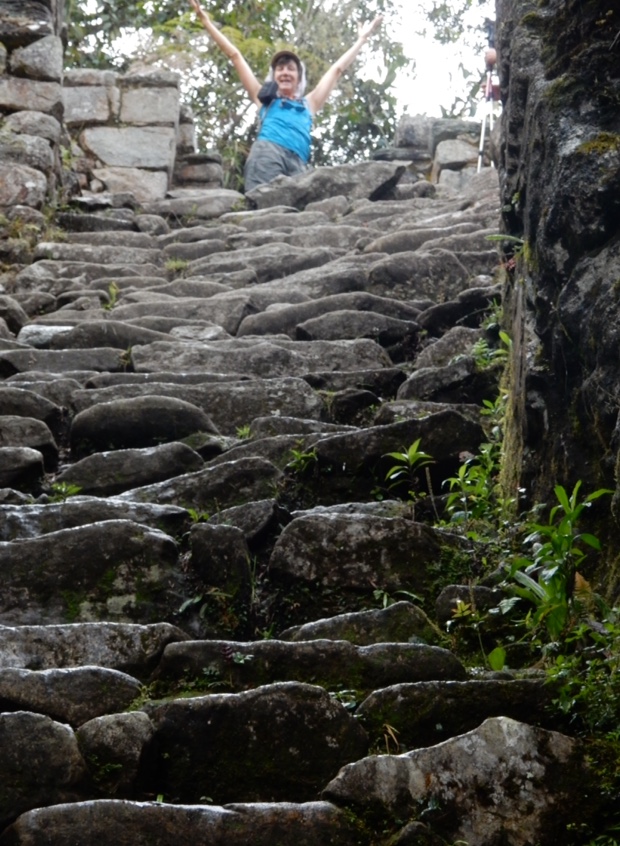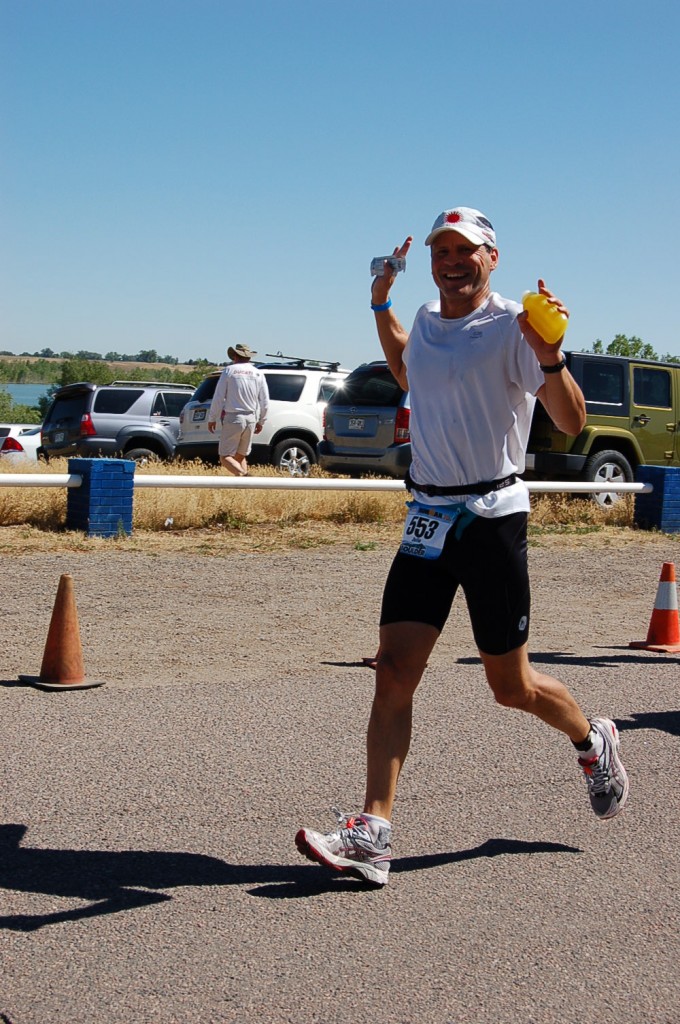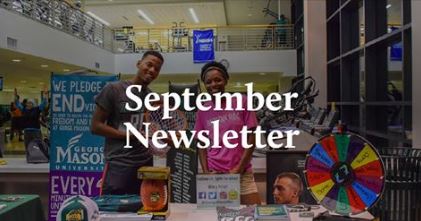Successful Masters Athletes Following Smart Training Plans
Posted: November 26, 2014 at 10:49 am
By Alison Hall
In August, Mason Recreation provided smart training tips for masters athletes. We recently caught up with three successful masters athletes who continue to follow smart training plans and stay active throughout life. The common thread with all three athletes is “age is only a number.”
Mason alumna Toni Binning competes in Olympic-style weight lifting competitions. Toni trains 60-90 minutes a session, 4-5 times a week, with no more than three days in a row. She recently set records for the snatch, clean and jerk, and competition total for the 40-44 age group and 48k weight class. All of Toni’s training is specific to Olympic lifting, and she stays injury-free by foam rolling and stretching before and after every training session. She’s not afraid to take a rest day or decrease the training intensity if need be, always focusing on smart training practices. With smart training, her next goal is to snatch at least her body weight in a competition. Toni believes you should not let age stop you from trying anything. Her advice is to listen to your body. If something hurts, stop. If you are tired or not sleeping, take a day or two off. Be sure to allow your body to recover. Seek out an expert to teach you correct mechanics and prevent injury. Toni shares more about her fitness activities in her blog at Fitnessfoodfamily.com.
lifting competitions. Toni trains 60-90 minutes a session, 4-5 times a week, with no more than three days in a row. She recently set records for the snatch, clean and jerk, and competition total for the 40-44 age group and 48k weight class. All of Toni’s training is specific to Olympic lifting, and she stays injury-free by foam rolling and stretching before and after every training session. She’s not afraid to take a rest day or decrease the training intensity if need be, always focusing on smart training practices. With smart training, her next goal is to snatch at least her body weight in a competition. Toni believes you should not let age stop you from trying anything. Her advice is to listen to your body. If something hurts, stop. If you are tired or not sleeping, take a day or two off. Be sure to allow your body to recover. Seek out an expert to teach you correct mechanics and prevent injury. Toni shares more about her fitness activities in her blog at Fitnessfoodfamily.com.
Mason Recreation member and Os her Lifelong Learning Institute student Wynne Tysdal recently traveled to Machu Picchu, Peru, for a hiking adventure. Wynne credits Mason Recreations’ Boot Camp and Yoga classes for her balance, strength, and endurance. All three were necessary on her Machu Picchu hikes. Her weekly plan consists of three Boot Camps, two Yoga classes, and Pilates. When Mason Recreations’ Boot Camp started last year, she had already decided that lunges, squats, and jumping jacks did not fit her “mature” fitness plan. Then she realized the benefits of strengthening glutes, hamstrings, and hip flexors by trying these exercises. She feels that even with squats, lunges, and some high-impact drills her arthritic knees are much happier, and she is stronger overall. It paid off on the hike—Wynne crawled right up the nearly vertical Monkey Steps at the end of the Inca Trail, passing by the other hikers. She says that the Boot Camp mountain climbers on Gliding Discs, although not her favorite, deserve all the credit. Wynne loves the energy that exercise gives her and loves feeling fit. Boot Camp is a great workout and it also has been a great way to meet people and build a support group. Boot Camp is offered at the Aquatic and Fitness Center Mondays, Wednesdays, and Fridays at 6:15 am.
her Lifelong Learning Institute student Wynne Tysdal recently traveled to Machu Picchu, Peru, for a hiking adventure. Wynne credits Mason Recreations’ Boot Camp and Yoga classes for her balance, strength, and endurance. All three were necessary on her Machu Picchu hikes. Her weekly plan consists of three Boot Camps, two Yoga classes, and Pilates. When Mason Recreations’ Boot Camp started last year, she had already decided that lunges, squats, and jumping jacks did not fit her “mature” fitness plan. Then she realized the benefits of strengthening glutes, hamstrings, and hip flexors by trying these exercises. She feels that even with squats, lunges, and some high-impact drills her arthritic knees are much happier, and she is stronger overall. It paid off on the hike—Wynne crawled right up the nearly vertical Monkey Steps at the end of the Inca Trail, passing by the other hikers. She says that the Boot Camp mountain climbers on Gliding Discs, although not her favorite, deserve all the credit. Wynne loves the energy that exercise gives her and loves feeling fit. Boot Camp is a great workout and it also has been a great way to meet people and build a support group. Boot Camp is offered at the Aquatic and Fitness Center Mondays, Wednesdays, and Fridays at 6:15 am.
Masters athlete Julio Blanco started competing in triathlons in 1987 when he was an undergraduate student at George Mason. Since then, he has completed 43 triathlons, varying in distance from sprint to half Ironman. Julio stays active year-round,  increasing his activity when training for a race. During the off-season, he runs 2-3 times a week, spins 2-3 times a week, and strength trains 2-3 times a week. Many times, he takes time off from swimming during the winter and starts again a month or two before a race. Julio has realized that with age his body has tightened up, and recovery takes longer. His main approach to avoiding injury is to listen to his body. If he thinks he’s overly fatigued, he’ll shorten a workout or take an extra rest day. He now devotes more time to flexibility and core strength, mainly by practicing yoga. He also says that sleep is key—if he doesn’t sleep well, it impacts his capacity for exercise. Julio feels that he has nothing left to prove as a triathlete, but he continues to be involved mostly because he enjoys staying active and being fit. Plus, doing the races is fun, and he takes pride in the fact that at almost 50 years old he can still give guys one or two decades younger than him a run for their money on the bike!
increasing his activity when training for a race. During the off-season, he runs 2-3 times a week, spins 2-3 times a week, and strength trains 2-3 times a week. Many times, he takes time off from swimming during the winter and starts again a month or two before a race. Julio has realized that with age his body has tightened up, and recovery takes longer. His main approach to avoiding injury is to listen to his body. If he thinks he’s overly fatigued, he’ll shorten a workout or take an extra rest day. He now devotes more time to flexibility and core strength, mainly by practicing yoga. He also says that sleep is key—if he doesn’t sleep well, it impacts his capacity for exercise. Julio feels that he has nothing left to prove as a triathlete, but he continues to be involved mostly because he enjoys staying active and being fit. Plus, doing the races is fun, and he takes pride in the fact that at almost 50 years old he can still give guys one or two decades younger than him a run for their money on the bike!
Reference:
Mason Recreation. Smart Training For Masters Athletes, https://recreation.gmu.edu/2014/08/smart-training-for-masters-athletes/


